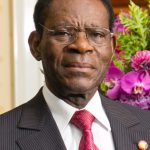Politics
Equatorial Guinea Politics
This page explores Equatorial Guinea’s political structure incorporating real-time RSS feed news and videos. By harnessing the power of RSS feeds, visitors can stay informed about the latest developments in Equatorial Guinea’s politics as they happen. The dynamic nature of these feeds ensures that users receive up-to-the-minute updates on political events, policy changes, and significant milestones, enabling them to stay abreast of the ever-evolving political scene.

Teodoro Obiang
2nd President of Equatorial Guinea
Incumbent Assumed office 8/3/79
Image credit
Equatorial Guinea is a small country located in Central Africa. The nation operates as a presidential republic, where the President serves both as the head of state and the head of government. The political power is largely centralized, and the country has been under the control of President Teodoro Obiang Nguema Mbasogo since 1979, making him one of the longest-serving leaders in the world.
In terms of its political structure, Equatorial Guinea is divided into two branches: executive and judicial, with the legislative powers vested in both the government and the bicameral Parliament. The executive branch includes the President, a Vice President, a Prime Minister, and Council of Ministers. The President is elected by absolute majority vote through a two-round system for a seven-year term. The President has considerable powers, including the ability to appoint and dismiss members of the government, dissolve the Chamber of Deputies (the lower house of the Parliament), call for legislative elections, and ratify laws.
The Parliament, or Cortes Generales, is bicameral, consisting of the Senate and the Chamber of Deputies. The Senate comprises 70 seats, of which 55 are elected by simple majority vote and 15 appointed by the President. The Chamber of Deputies has 100 members elected by proportional representation for a five-year term. Both chambers are responsible for making laws, but in practice, the President has been known to wield significant influence over the legislative process. The judicial branch, led by the Supreme Court, operates nominally independently, but in reality, is subjected to political influence and control from the executive branch.
Unless other sources are listed, original content is provided by ChatGPT. ChatGPT may produce inaccurate information about people, places, or facts. #EquatorialGuinea #EquatorialGuineaPolitics #EquatorialGuineaNews #EquatorialGuineaNewsToday #EquatorialGuineaRSSFeed #BlahFace



